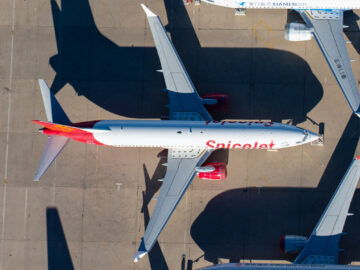
After spending months on the ground, on August 26th, India’s aviation safety regulator finally ungrounded the Boeing 737 MAX. While the aviation safety regulator previously allowed international operators to overfly Indian airspace using the aircraft type, this is the first time since the grounding order that carriers in India will be allowed to use the Boeing 737 MAX for commercial operations.
While there may be only one operator of the 737 MAX in India, there are also other start-up airlines considering the 737 MAX in a market that is mainly dominated by Airbus. So what does the ungrounding order mean for the Indian aviation sector and what airlines in India are currently using the aircraft?
Back in 2019, numerous aviation safety regulators across the globe grounded the Boeing 737 MAX, until the aircraft manufacturer resolved serious technological and design flaws which were discovered following two fatal crashes in 2018 and 2019. Boeing would go on to acknowledge that there were design and technical flaws with the aircraft type, damaging not only its reputation but also the confidence of airlines and international aviation safety regulators, as the future of the 737 MAX hung in the balance.
Following a series of structural and technological updates to the airline, the Boeing 737 MAX was recertified by the Federal Aviation Administration (FAA) in the United States on November 18th last year. Subsequently, international aviation regulators conducted their own independent tests on the MAX series, before ultimately lifting the ban on the aircraft type.
Since the Boeing 737 MAX grounded order was first lifted in the United States, 17 regulators have also recertified the 737 MAX. Over the course of this year, Boeing has been working closely with a number of aviation safety agencies in Asia including India and China, in an effort to get them to rescind their bans on the aircraft type. Back in April, India’s aviation safety regulator, the DGCA allowed international airlines to overfly the country’s airspace with the 737 MAX, however, in the last few weeks, Indian airlines have only now been allowed to use their Boeing 737 MAX aircraft for commercial operations.
At present, SpiceJet is the only active operator of the 737 MAX in India. This new development will certainly benefit SpiceJet, which currently has a number of MAX jets parked. While it could open an opportunity for Jet Airways and new market entrant Akasa Air if both airlines opt to use the 737 MAX aircraft for future operations. Ultimately, this new regulation by the DGCA could lead to a major shift in aircraft manufacturer preference in the Indian aviation sector.
SpiceJet has stated that it plans to resume 737 MAX operations by the end of September, once the entire MAX fleet has undergone the necessary changes. Despite not being able to fly its current fleet of 13 aircraft, the DGCA never received any pressure from the carrier to restart MAX operations. Industry analysts and enthusiasts attribute this to the significant remuneration SpiceJet was receiving from Boeing for the grounded MAX jets.
At the end of the quarter for December 2020, SpiceJet’s accounts showed that the airline had received USD$150 million in “other income.” While the carrier didn’t state where this income came from, industry analysts believe this is part of Boeing’s remuneration package. This ultimately allowed SpiceJet to make a significant profit from aircraft that are not flying commercially. This compensation funding from Boeing will now not be available to SpiceJet following the approval of the Boeing 737 MAX by the DGCA.
India’s new start-up airline, Akasa Air was also eagerly awaiting an announcement from authorities on the ungrounding of the 737 MAX. The airline plans to order 100 MAX jets from Boeing and could operate an entire 737 MAX fleet. With the grounding order now rescinded, the airline can negotiate a deal with the United States aircraft manufacturer.
A similar situation has also arisen for Jet Airways. The recently reestablished airline plans to resume operations with 30 aircraft and will acquire more as time passes. The airline will initially begin operations with the 737 NG but the airline will most likely expand its aircraft portfolio to the more diverse and fuel-efficient aircraft, such as the 737 MAX.
Overall, the approval of the 737 MAX in India is a major win for Boeing, especially in one of the world’s largest aviation markets. The Indian aviation market has predominantly been a narrow-body market, up until now the aircraft manufacturer was losing a considerable share of the market as its new MAX remained on the ground for over 2 years. Now, the American manufacturer will look to slowly claw its way back into the Indian aviation market, with new orders from Indian airlines.
- 100
- 2019
- 2020
- active
- aircraft
- airline
- Airlines
- American
- Announcement
- April
- asia
- AUGUST
- aviation
- Ban
- Bans
- Boeing
- China
- commercial
- Compensation
- confidence
- Current
- deal
- Design
- Development
- discovered
- Expand
- faa
- Federal
- Federal Aviation Administration
- Finally
- First
- first time
- flaws
- FLEET
- funding
- future
- HTTPS
- Including
- Income
- india
- industry
- International
- IT
- lead
- major
- Manufacturer
- Market
- Markets
- million
- months
- New Market
- open
- Operations
- Opportunity
- order
- orders
- Other
- portfolio
- present
- pressure
- Profit
- Regulation
- Regulators
- Safety
- Series
- Share
- shift
- So
- Spending
- Start-up
- State
- States
- Technical
- tests
- The Future
- time
- United
- United States
- Updates
- win
- year
- years




